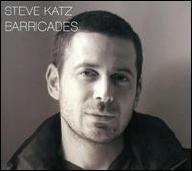Katz became an established part of the Village music scene, leaving college before graduation and teaching guitar, along with playing whatever gigs there were. Fate took a hand when he auditioned for what was supposed to be a temporary spot in the Danny Kalb Quartet, formed by fellow guitarist Danny Kalb -- playing electric guitar for the first time in his life at the audition, he was intimidated by the instrument and its power. Kalb liked what he heard (or, actually, didn't hear, for Katz had turned his amp down to the lowest possible setting), however, and hired him. The Danny Kalb Quartet, however, evolved into a quintet with the addition of Al Kooper, and took on a new name -- the Blues Project. New York City's first major home-grown contribution to blues-rock, the Blues Project had an impact on music that far exceeded their relatively modest record sales, and his presence in their lineup, as well as the presence on their albums of several of his original songs, ensured that Katz would have a mention in any serious history of mid-'60s rock.
The group's lineup was also as unstable as it was prodigiously talented -- they lost their original lead singer practically before they were out of the starting gate, and they'd break up after just two years, in the spring of 1967. Katz was part of the Blues Project lineup that played the Monterey Pop Festival that year, but he didn't stick around long enough to be part of the offshoot group Seatrain that followed. Instead, later that same year, he was back in Al Kooper's orbit, initially as part of a band put together for a money-raising concert to get Kooper to England; there wasn't enough money to accomplish that, but Katz and the others had enjoyed the gig well enough to tell Kooper that they wanted to be part of his musical plans, whatever they were. The result was the formation of the original Blood, Sweat Tears and the Child Is Father to the Man album -- Katz was there on guitar and also sang on a pair of songs on the album, which went on to become one of the most critically acclaimed records of the entire decade. As a result of disappointing sales, and record company and band pressures, Kooper left the lineup soon after the release, and in the resulting lineup shifts, the group was transformed into much more of a commercial pop outfit, fronted by David Clayton-Thomas. Katz was still there for the self-titled second album by the group (and its six million sales), and the three that followed, still playing guitar and singing a bit as well. He remained friends with Kooper, however, and when the latter started producing the debut album of a Southern band called Lynyrd Skynyrd and needed a harmonica player, he brought Katz in for the job.
Katz left Blood, Sweat Tears, ironically enough, in the immediate wake of the best of their later albums, New Blood. The group's myriad shifts in personnel resulted in a musically challenging but much more formalistic approach to music-making on New Blood. This didn't sit well with Katz, who was more of a spontaneous improviser -- as he told Al Quaglieri for the notes on What Goes Up: The Best of Blood, Sweat Tears, he wasn't even able to read the charts he was handed, and found the fun side of the group's work draining out very fast. He left the lineup and landed not only on his feet, but on the successful start-up on a new career. Earlier the same year that he'd quit, he had become friends with Lou Reed, and he ended up producing Reed's Rock N Roll Animal, Sally Can't Dance, and Live. He also joined ex-Velvet Underground drummer Doug Yule in the studio band American Flyer, which gave him a chance to keep his hand in playing.
Katz became the head of A&R for Mercury Records East Coast office in 1977, and spent three years in that position. The highlight for him was his recording of three albums by the Irish progressive-folk band Horslips, which brought him to Ireland. Those visits were to prove fateful, as Katz became enamored of Irish music, culture, and history, immersing himself in all of it, but especially the music -- when the smoke cleared, he was working as the managing director of the folk label Green Linnet Records. He put his hand back in music every so often, such as when he joined Al Kooper for a series of shows that reprised the music of Kooper's entire performing career on-stage; oddly enough, Katz's work had to be wiped from the master tape of the double-CD set that resulted when he refused to give permission for a commercial release of his work. In more recent years, Katz has spent his time as a consultant, but is otherwise semi-retired and married in upstate New York. ~ Bruce Eder, Rovi
|
1
|
|
Thrive |
|
2
|
|
Today I Saw Hope |
|
3
|
|
Barricades |












